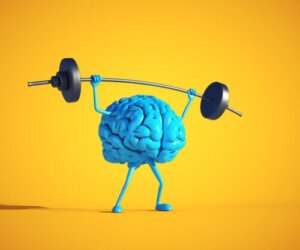10 Pillars for Your Brain Health


Reviewed and approved by the nurse Leidy Mora Molina
The pillars of brain health are a set of factors and strategies that can help us prevent, combat, or slow the cognitive decline associated with age. A healthy diet, good rest, exercise, avoiding alcohol consumption, and even cultivating friendships are measures we can take to ensure that our minds keep functioning well.
Thanks to advances in medicine, our life expectancy has increased. However, various neurological problems, such as Alzheimer’s disease, continue to occur in the older population. The impact on cognitive functioning, memory, and language affects emotional functioning, autonomy, and personal relationships.
What is brain health?
We’ve all heard of mental health referred to as the opposite of mental illness or as a concrete health field or discipline. Although, according to research, there’s currently a lot of progress when it comes to developing an approach that’s focused more on the promotion of mental health instead of just prevention and treatment.
Nowadays, the concept of brain health has also emerged. This concept encompasses physical, neurological, emotional, and psychosocial aspects of our health.
Thus, according to studies on the subject, brain health promotion involves interventions that contribute to good mental functioning, as well as to delaying the onset of cognitive problems. Such strategies are based on neuroscience theories and more specifically on the principle that the neuroplasticity of the brain is preserved throughout life.
We think you may be interested in reading this, too: Drinking Alcohol During Pregnancy Could Change the Shape of Babies’ Brains
The common enemies of brain health
Before talking about the pillars of brain health, it’s necessary to first understand what can affect it. In this regard, it should be noted that certain mental disorders are associated with genetic factors, and others are caused by age-related deterioration.
However, there are risk factors that increase the possibility of their occurrence. Among these enemies of brain health, the following an be mentioned:
- The consumption of alcohol, tobacco, and drugs.
- Stress, depression, or anxiety.
- Altered circadian rhythms and sleep disorders.
- Overwork, with little rest and few leisure activities.
- Environmental pollution: The presence of carbon monoxide, heavy metals, pesticides, and microplastics.
- A lack of fundamental nutrients for the brain: This includes antioxidants, vitamin B12, omega-3, zinc, iron, and magnesium.
- A sedentary lifestyle: This is related to the deterioration of nerve fibers in the brain and to the thinning of the medial temporal lobe.
- Psychopharmaceuticals: Although these medications are prescribed to treat some problems, in the long run, they can cause the onset of memory loss, for example.
The pillars of brain health
Fortunately, it’s possible to combat these problems and even prevent or delay their appearance. To do so, we must pay attention to and strengthen the pillars of brain health that we will tell you more about below.
1. Whole-brain health
It’s all about a healthy mind in a healthy body, according to an old proverb. The same is true the other way around. In fact, we actually can’t separate one from the other.
When one of the components of this dynamic isn’t functioning well, it affects the other. If we’re stressed out, for instance, we may become physically ill. And if we’re physically ill, our mood is affected and we may not be able to stop worrying about it.
So, the first pillar of brain health is body health. In this order of ideas, we must do everything possible to lead a healthy lifestyle, with a balanced diet, good habits, taking care of our hygiene, going for regular medical check-ups, and following the recommendations given by the health professional.

2. Gut function
According to recent research, there’s a bidirectional relationship between the microbiota of the digestive tract and the central nervous system. This is known as the gut-brain axis. This axis is key to understanding various neurological disorders.
Gut bacteria produce neuroactive substances (hormones and neurotransmitters). Hence, studies are being developed to evaluate the impact of probiotics on mental illnesses.
Therefore, we should always include healthy foods in our diet. Likewise, we should avoid anything that affects our intestinal bacteria. This implies decreasing the consumption of ultra-processed foods and alcohol. Uncontrolled stress, on the other hand, can also lead to dysbiosis (imbalance of the microbiota).
3. Feed the brain
Nutrition is a determining factor for the proper functioning of the brain. Some foods that can be beneficial for this important organ of the central nervous system are the following:
- Fresh fruits and vegetables
- Olive oil
- Oily fish
- Nuts and dried fruits
As mentioned in the previous point, avoid excessive intake of ultra-processed foods, saturated fats, and refined sugar. Also, make sure to decrease your salt consumption.
Like this article? You may also like to read: What is a Brain Aneurysm? Learn About Emilia Clarke’s Condition During Games of Thrones
4. “One more muscle”
Physical activity is essential, but not just for a toned physique.
The brain benefits from exercise in several ways. There’s increased blood flow, improved tissue oxygenation, and a release of growth factors that are considered protective of nerve cells.
Also, research indicates that it can delay age-related cognitive decline by helping to control certain modifiable risk factors. Other studies also report that aerobic exercise, in particular, can not only attenuate cognitive decline but reduce a person’s risk of dementia.
For these reasons, there’s no doubt that physical activity is one of the cornerstones of brain health. In both humans and animals, it’s associated with the following benefits:
- Exercise stimulates neurogenesis.
- It improves spatial memory.
- It attenuates the loss of gray matter in the brain.
- Exercise promotes greater neuroplasticity.
- It induces brain neurotrophic factors.
- Exercise mitigates stroke risk.
- It improves the connectivity of cognitive networks in the brain.
5. Sweet dreams
While we sleep, a number of processes related to neuronal and metabolic activity take place, which allows us to maintain brain health. Sleep is as important for cognitive functioning as rest is for the body.
In fact, the research emphasizes its relevance to brain function and has even established correlations between sleep disturbances and mental health problems.
In general, good sleep is one of the keys to a healthy lifestyle. Therefore, we should take into account the following recommendations:
- Do not exercise intensely at night.
- Maintain a regular sleep schedule.
- Each a light dinner at least two hours before bedtime.
- Avoid working or using electronic devices in bed.
- Have a conducive environment for sleep in the bedroom in terms of temperature, colors, and noises.
- Performing relaxing activities before going to bed, such as meditating or listening to music.

6. Brain gymnastics
There are also some particular exercises for the brain. This is about challenging the mind to make it work harder and stay healthy. The more active we are in this regard, the better it will work.
In this regard, in a trial conducted with older adults (with an average age of 73 years) who were given cognitive training, the results highlight that there were improvements in variables such as memory, reasoning, and processing speed.
There are different activities that can be of benefit to exercise the brain. In this regard, we have all sorts of courses, learning a language, reading, playing a musical instrument, or putting together puzzles, among other things.
7. An alcohol and smoke-free brain
There’s abundant research that highlights the association between cognitive impairment and excessive alcohol consumption. In this regard, it’s often pointed out that alcoholism seems to be capable of producing brain damage through apoptosis, oxidative stress, and altering the neurogenesis of the brain.
A similar effect can be observed with smoking. According to studies, smoking has a positive relationship with cognitive impairment, in addition to being linked to respiratory diseases.
Therefore, another of the pillars for brain health is to stay away from cigarettes and avoid excessive or frequent alcohol consumption.
8. Zero stress
We’ve already mentioned that this problem can have a negative impact on the gut microbiota, which in turn affects brain function. However, in addition, when there’s a situation of chronic stress, implicit or explicit memory and working memory can be affected, according to studies on the subject.
So, it’s important to learn to manage the factors that can trigger stress. At the same time, it’s also important to learn to try to control our reactions to stress. If necessary, help should be sought from a mental health professional.
9. Mindfulness and meditation
In order to lessen the impact of stress, certain strategies can be used to cultivate positive mental states. These include mindfulness (mindfulness) and meditation.
Meditation can not only relax us, but also generate a change in the structure and functioning of the mind, positively affecting neuroplasticity. On the other hand, mindfulness and awareness help us to train ourselves to have less mental wear and tear.
10. A social brain
Social relationships are another basic pillar for brain health. In this regard, research findings suggest that a socially active and participatory lifestyle mitigates the effects of the physiological process of brain aging.
When socializing, we have to put our minds to work, performing various functions; we have to remember the faces and names of people, pay attention to what is being said, reason what we are going to answer, and even memorize birthdays!

An ever-young brain
When it comes to strengthening these pillars of brain health, it’s never too late to start. According to what we have talked about in this article, the brain can maintain its neuroplasticity.
We can start working today to optimize mental functioning, reduce our risk of various diseases, prevent age-related deterioration, and even delay the symptoms of Alzheimer’s disease. Keeping the brain forever young is possible, but it’s only achieve with healthy daily effort.
All cited sources were thoroughly reviewed by our team to ensure their quality, reliability, currency, and validity. The bibliography of this article was considered reliable and of academic or scientific accuracy.
- Ovidio Muñoz C, Restrepo D, Cardona D. Construcción del concepto de salud mental positiva: revisión sistemática. Rev Panam Salud Pública. 2016; 39(3): 166-173.
- Bertolote J. Raíces del concepto de salud mental. World Psychiatry. 2008; 6(2):113-116.
- Alfaro C, Mesa-Gresa P, Redola R. ¿Qué factores deberían incluirse en una intervención multicomponente dirigida al mantenimiento de la salud cerebral? Calidad de Vida y Salud. 2017; 10(1). Disponible: http://revistacdvs.uflo.edu.ar/index.php/CdVUFLO/article/view/145
- Ortiz T, Poch-Broto J, Requena C, Santos J, et al. Neuroplasticidad cerebral en áreas occipitales en niños ciegos. Rev Neurol 2010; 50 (Supl 3): S19-23.
- Guadamuz Delgado J, Miranda Saavedra M, Mora Miranda N. Actualización sobre neuroplasticidad cerebral. Rev.méd.sinerg. 2022; 7(6):e829. Disponible en: https://revistamedicasinergia.com/index.php/rms/article/view/829
- Ibáñez Benages E. Nutrientes y función cognitiva Nutrición Hospitalaria. 2009; 2(2): 3-12.
- Gómez-Eguílaz M, Ramón-Trapero J, Pérez-Martínez L, Blanco J. El eje microbiota-intestino-cerebro y sus grandes proyecciones. Rev Neurol. 2019; 68: 111-7.
- Olazo Márquez N. Efectos del uso de prebióticos y probióticos en la enfermedad de Alzheimer. Actualización en Nutrición. 2020; 21(2): 65-70.
- Ríos-Flórez J, López-Gutiérrez C, Escudero-Corrales C. Cronobiología del sueño y su influencia en la función cerebral. 2019; 13(1): 12-33.
- Kirk-Sanchez N, McGough E. Physical exercise and cognitive performance in the elderly: current perspectives. Clin Interv Aging. 2014; 9: 51-62.
- Ahlskog J, Geda Y, Graff-Radford N, Petersen R. Physical exercise as a preventive or disease-modifying treatment of dementia and brain aging. Mayo Clin Proc. 2011; 86(9): 876-884.
- Rebok G, Ball K, Guey L, et al. Ten-year effects of the advanced cognitive training for independent and vital elderly cognitive training trial on cognition and everyday functioning in older adults. J Am Geriatr Soc. 2014; 62(1): 16-24.
- Flórez G, Espandian A, Villa R, Sáiz P. Deterioro cognitivo y dependencia alcohólica, implicaciones clínicas. Adicciones. 2019; 31(1): 3-7.
- Liu J, Shang S, Li P, et al. Asociación entre el tabaquismo actual y el deterioro cognitivo y su relación con la edad: estudio transversal realizado en Xi’an (China). Medicina Clínica. 2017; 149(5): 203-208.
- Sandi C. Influencia del estrés sobre las capacidades cognitivas. Participación educativa. 2012; número extraordinario: 39-46.
- Miceli S, Maniscalco L, Matranga D. Social networks and social activities promote cognitive functioning in both concurrent and prospective time: evidence from the SHARE survey. Eur J Ageing 2019;16(2):145-54.
This text is provided for informational purposes only and does not replace consultation with a professional. If in doubt, consult your specialist.








